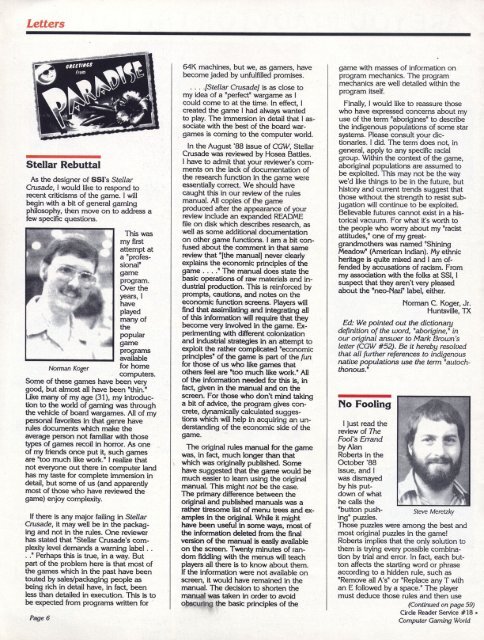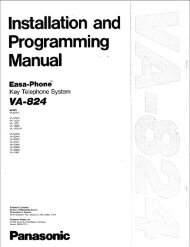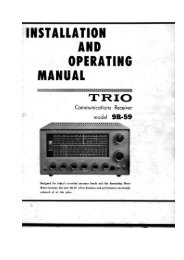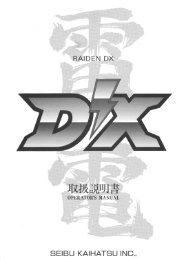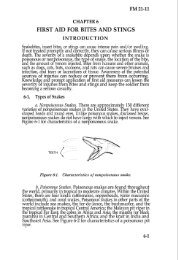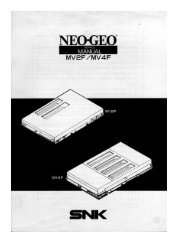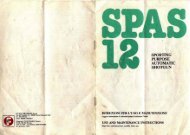Computer Gaming World Issue 54 - TextFiles.com
Computer Gaming World Issue 54 - TextFiles.com
Computer Gaming World Issue 54 - TextFiles.com
Create successful ePaper yourself
Turn your PDF publications into a flip-book with our unique Google optimized e-Paper software.
Letters<br />
Stellar Rebuttal<br />
As the designer of SSI's Stellar<br />
Crusade, I would like to respond to<br />
recent criticisms of the game. I will<br />
begin with a bit of general gaming<br />
philosophy, then move on to address a<br />
few specific questions.<br />
This was<br />
my first<br />
attempt at<br />
a "professional"<br />
game<br />
program.<br />
Over the<br />
years, I<br />
have<br />
played<br />
many of<br />
the<br />
popular<br />
game<br />
programs<br />
available<br />
for home<br />
<strong>com</strong>puters.<br />
Some of these games have been very<br />
good, but almost all have been "thin."<br />
Like many of my age (31), my introduction<br />
to the world of gaming was through<br />
the vehicle of board wargames. All of my<br />
personal favorites in that genre have<br />
rules documents which make the<br />
average person not familiar with those<br />
types of games recoil in horror. As one<br />
of my friends once put it, such games<br />
are "too much like work." I realize that<br />
not everyone out there in <strong>com</strong>puter land<br />
has my taste for <strong>com</strong>plete immersion in<br />
detail, but some of us (and apparently<br />
most of those who have reviewed the<br />
game) enjoy <strong>com</strong>plexity.<br />
If there is any major failing in Stellar<br />
Crusade, it may well be in the packaging<br />
and not in the rules. One reviewer<br />
has stated that "Stellar Crusade's <strong>com</strong>plexity<br />
level demands a warning label . .<br />
. ." Perhaps this is true, in a way. But<br />
part of the problem here is that most of<br />
the games which in the past have been<br />
touted by sales/packaging people as<br />
being rich in detail have, in fact, been<br />
less than detailed in execution. This is to<br />
be expected from programs written for<br />
64K machines, but we, as garners, have<br />
be<strong>com</strong>e jaded by unfulfilled promises.<br />
. . . [Stellar Crusade] is as close to<br />
my idea of a "perfect" wargame as I<br />
could <strong>com</strong>e to at the time. In effect, I<br />
created the game I had always wanted<br />
to play. The immersion in detail that I associate<br />
with the best of the board wargames<br />
is <strong>com</strong>ing to the <strong>com</strong>puter world.<br />
In the August '88 issue of CGW, Stellar<br />
Crusade was reviewed by Hosea Battles.<br />
I have to admit that your reviewer's <strong>com</strong>ments<br />
on the lack of documentation of<br />
the research function in the game were<br />
essentially correct. We should have<br />
caught this in our review of the rules<br />
manual. All copies of the game<br />
produced after the appearance of your<br />
review include an expanded README<br />
file on disk which describes research, as<br />
well as some additional documentation<br />
on other game functions. I am a bit confused<br />
about the <strong>com</strong>ment in that same<br />
review that "[the manual] never clearly<br />
explains the economic principles of the<br />
game . . . ." The manual does state the<br />
basic operations of raw materials and industrial<br />
production. This is reinforced by<br />
prompts, cautions, and notes on the<br />
economic function screens. Players will<br />
find that assimilating and integrating all<br />
of this information will require that they<br />
be<strong>com</strong>e very involved in the game. Experimenting<br />
with different colonization<br />
and industrial strategies in an attempt to<br />
exploit the rather <strong>com</strong>plicated "economic<br />
principles" of the game is part of the fun<br />
for those of us who like games that<br />
others feel are "too much like work." All<br />
of the information needed for this is, in<br />
fact, given in the manual and on the<br />
screen. For those who don't mind taking<br />
a bit of advice, the program gives concrete,<br />
dynamically calculated suggestions<br />
which will help in acquiring an understanding<br />
of the economic side of the<br />
game.<br />
The original rules manual for the game<br />
was, in fact, much longer than that<br />
which was originally published. Some<br />
have suggested that the game would be<br />
much easier to learn using the original<br />
manual. This might not be the case.<br />
The primary difference between the<br />
original and published manuals was a<br />
rather tiresome list of menu trees and examples<br />
in the original. While it might<br />
have been useful in some ways, most of<br />
the information deleted from the final<br />
version of the manual is easily available<br />
on the screen. Twenty minutes of random<br />
fiddling with the menus will teach<br />
players all there is to know about them.<br />
If the information were not available on<br />
screen, it would have remained in the<br />
manual. The decision to shorten the<br />
manual was taken in order to avoid<br />
obscuring the basic principles of the<br />
game with masses of information on<br />
program mechanics. The program<br />
mechanics are well detailed within the<br />
program itself.<br />
Finally, I would like to reassure those<br />
who have expressed concerns about my<br />
use of the term "aborigines" to describe<br />
the indigenous populations of some star<br />
systems. Please consult your dictionaries.<br />
I did. The term does not, in<br />
general, apply to any specific racial<br />
group. Within the context of the game,<br />
aboriginal populations are assumed to<br />
be exploited. This may not be the way<br />
we'd like things to be in the future, but<br />
history and current trends suggest that<br />
those without the strength to resist subjugation<br />
will continue to be exploited.<br />
Believable futures cannot exist in a historical<br />
vacuum. For what it's worth to<br />
the people who worry about my "racist<br />
attitudes," one of my greatgrandmothers<br />
was named "Shining<br />
Meadow" (American Indian). My ethnic<br />
heritage is quite mixed and I am offended<br />
by accusations of racism. From<br />
my association with the folks at SSI, I<br />
suspect that they aren't very pleased<br />
about the "neo-Nazi" label, either.<br />
Norman C. Koger, Jr.<br />
Huntsville, TX<br />
Ed: We pointed out the dictionary<br />
definition of the word, "aborigine," in<br />
our original answer to Mark Brown's<br />
letter (CGW #52). Be it hereby resolved<br />
that all further references to indigenous<br />
native populations use the term "autochthonous."<br />
No Fooling<br />
I just read the<br />
review of The<br />
Fool's Errand<br />
by Alan<br />
Roberts in the<br />
October '88<br />
issue, and I<br />
was dismayed<br />
by his putdown<br />
of what<br />
he calls the<br />
"button pushing"<br />
puzzles.<br />
Those puzzles were among the best and<br />
most original puzzles in the game!<br />
Roberts implies that the only solution to<br />
them is trying every possible <strong>com</strong>bination<br />
by trial and error. In fact, each button<br />
affects the starting word or phrase<br />
according to a hidden rule, such as<br />
"Remove all A's" or "Replace any T with<br />
an E followed by a space." The player<br />
must deduce those rules and then use<br />
(Continued on page 59)


